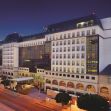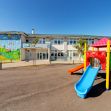A 17-year-old man committed suicide by jumping off the roof of a parking structure at a shopping center in Glendale, California. The young man struck and injured plaintiff Yuan Xiao when he fell on him before he hit the ground. Xiao sued the shopping center for premises liability under a set of California laws that require property owners to protect others from dangerous conditions that could cause damage or injuries. The shopping center moved for summary judgment, claiming it owed no “duty of care” to the plaintiff. The trial court agreed, mainly because a similar incident had never previously occurred, so the plaintiff’s injury was not foreseeable. The Court of Appeal has now affirmed the trial court’s ruling.
The defendant shopping center where the suicide occurred is called The Americana at Brand (Americana). Los Angeles County Superior Court Judge Michael E. Whitaker heard the original case, in which he ruled for Americana because it was not foreseeable that someone would jump off the parking structure roof and land on its premises. In making his ruling, Whitaker had admitted evidence that showed no similar incidents had ever occurred at Americana. This ruling was the subject of Xiao’s appeal.
Americana won at the trial court level largely because it proved the tragic incident was not foreseeable. The testimony of a shopping center security guard was put into evidence, in which he said he had searched all incident reports at Americana and determined that there were no previous suicides and no one had ever jumped from the parking structure before. Other evidence showed that the parking structure was in line with all relevant building codes.
Xiao argued that the security guard’s testimony should not have been admitted because it did not include information about what the cost of installing additional safety measures on the parking structure roof would have been. He appealed Whitaker’s ruling to Division Five of California’s Second District Court of Appeal where a unanimous three-judge panel affirmed the trial court ruling on January 12.
In an unpublished opinion authored by Justice Lamar Baker, the appellate court quickly explained that precedent had determined that “Whether defendants had a duty to protect patrons from persons jumping from buildings on their property is a function of the foreseeability of such an event and the burden of implementing preventative measures.” He elaborated that foreseeability was determined by whether similar incidents had occurred at the location. He concluded that “the trial court did not err in overruling the objection to (the guard’s) declaration because the rules of evidence do not bar his statement…and the absence of any such report is a trustworthy indication that there was no prior similar incident.”
He explained that in order to reverse a summary judgment ruling and establish that the trial court abused its discretion, Xiao had to show that one or more elements of the cause of action could not be established. He could not do so. Similarly, the plaintiff had to show that Americana had a legal duty of care that was breached and was the proximate cause of his injury.
Baker then discussed the law of premises liability, which he said, is the same as negligence. Both would require a showing that the shopping center possessed the premises and had a right to control and manage them. These elements could lead to a duty to act. But, he explained, this duty is not absolute. The judge said other precedents can “warrant a departure from that duty.”
These exceptions, he wrote, include “the foreseeability of harm to the plaintiff, the degree of certainty that the plaintiff suffered injury, the closeness of the connection between the defendant’s conduct and the injury suffered, the moral blame attached to the defendant’s conduct, the policy of preventing future harm, the extent of the burden to the defendant and consequences to the community of imposing a duty to exercise care with resulting liability for breach, and the availability, cost, and prevalence of insurance for the risk involved.”
Baker then applied this list of exceptions to Xiao’s case. He then cited California Evidence Code §1272, which details when a business record can be admissible when it is “offered to prove the nonoccurrence of (an) act or event.” The business record had to be made in the regular course of business and the source of the record must also be trustworthy. Here, the testimony of the security guard satisfied all of these conditions, since it was his responsibility to “oversee preparation of all incident reports” that took place at Americana.
Xiao argued that the trial court’s admission of the guard’s statement was an abuse of discretion. He said the Evidence Code allows records but does not permit evidence about the lack of records. The appellate court disagreed and Baker quickly concluded, “We therefore hold the trial court acted within its discretion when admitting and subsequently relying on evidence that no prior similar incidents occurred at the Americana. That resolves our task in this appeal.”






